Facebook and personal data
In this post I will talk about Facebook and our personal data. What does Facebook know about us?
Although it is impossible to know everything Facebook knows about us, we can still make a list that, although incomplete, should give us goosebumps.
Facebook, along with Google, is one of the pioneering companies of surveillance capitalism. As such, it is hungry for any data it can extract from any of its users. Through this data and its processing, Facebook can profile its users and generate huge profits.
We can divide this data into 2 categories:
- Personal data that are given by users in a more or less conscious manner.
- Behavioural data that are extracted without the knowledge of users.
In this article I will only talk about the first category, I will deal with the other in subsequent posts.

Of the two categories of data I mentioned above, the first is the least invasive and should surprise us the least. It should not surprise us because it is data that we have given to Facebook, more or less consciously. However, if you have had a Facebook account for some time and are an average active user, you will see that Facebook knows a lot more about you than you think. In fact, Facebook ‘remembers’ things you have done that you have permanently, or at least temporarily, forgotten about. What kind of things? Things like sentences you’ve written, reactions you’ve had, places you’ve been, events you’ve attended, videos you’ve seen, friendships you’ve made and even photos you’ve taken or posed for.
Don’t believe it? Try it for yourself!
By following the instructions below, you can get an idea of the personal data that Facebook has on you and perhaps gain a better understanding of your activity on this platform.
Download your personal data from Facebook
After the very serious Facebook-Cambridge Analytica scandal that took place in 2018, which was also told by the very interesting documentary entitled “The Great Hack” that you can find on the resources page, Facebook received enormous pressure and had to implement a system so that users could download their personal data. Maybe not all of it, but at least the ones it can’t deny having.
You can download your personal data from Facebook in the following way:
1. Access your Facebook’s account
2. Click on the down arrow symbol in the top right corner of your home screen.
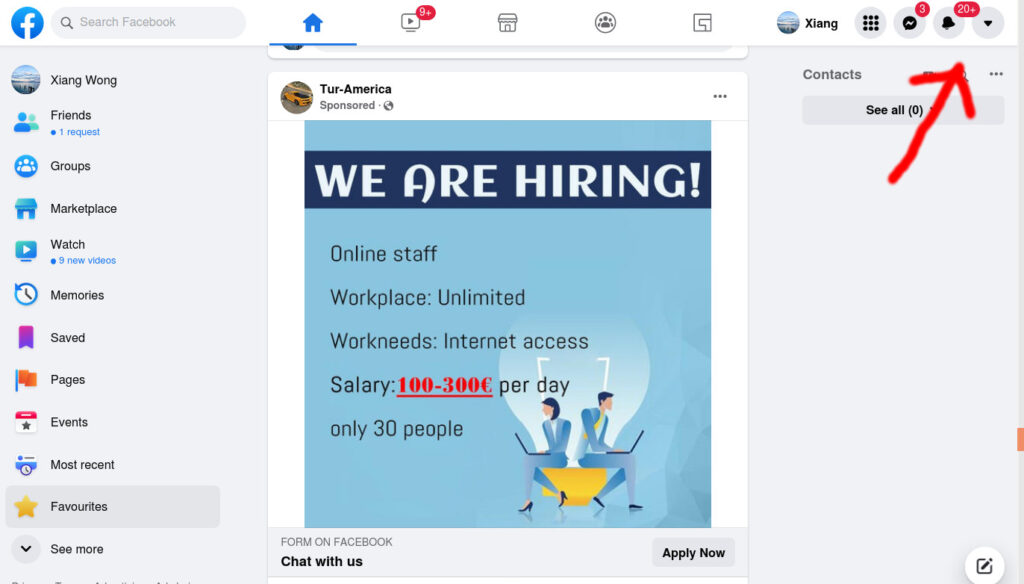
3. Click on “Settings and privacy”
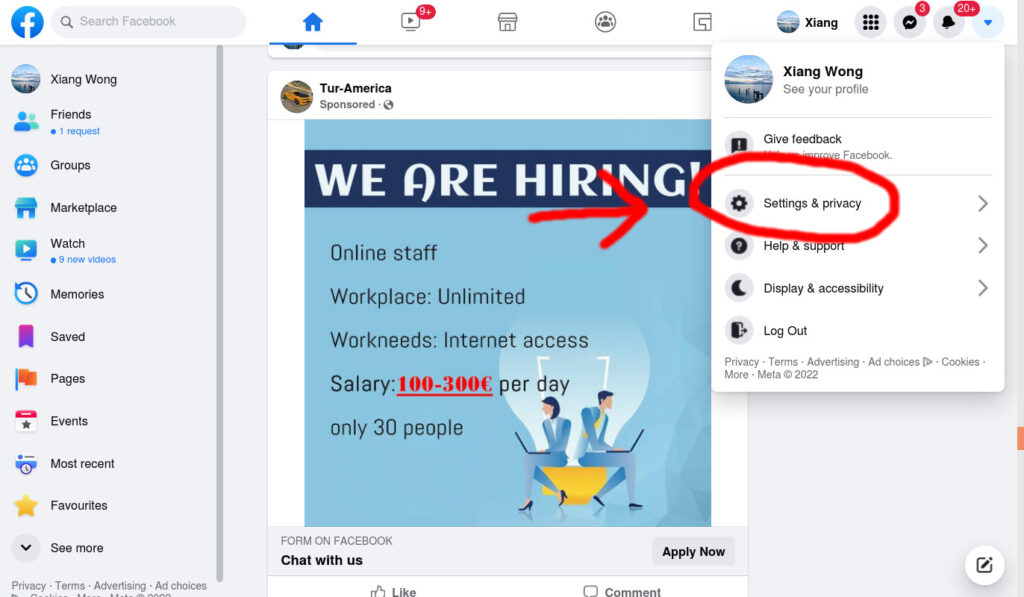
4. Click on “Settings”
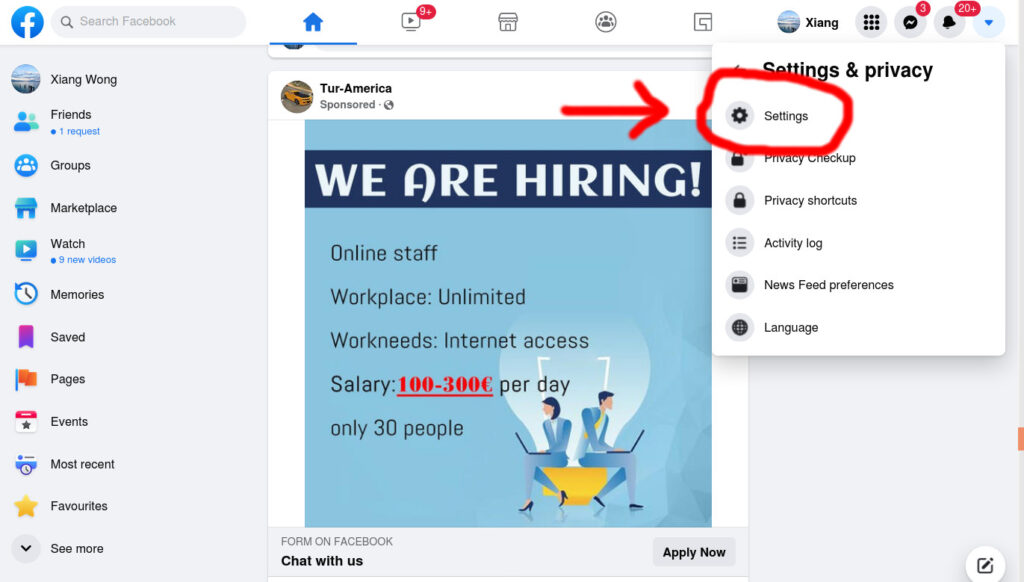
5. After clicking on ‘Your Facebook information’ in the left column, click on ‘Download your information’ in the right column
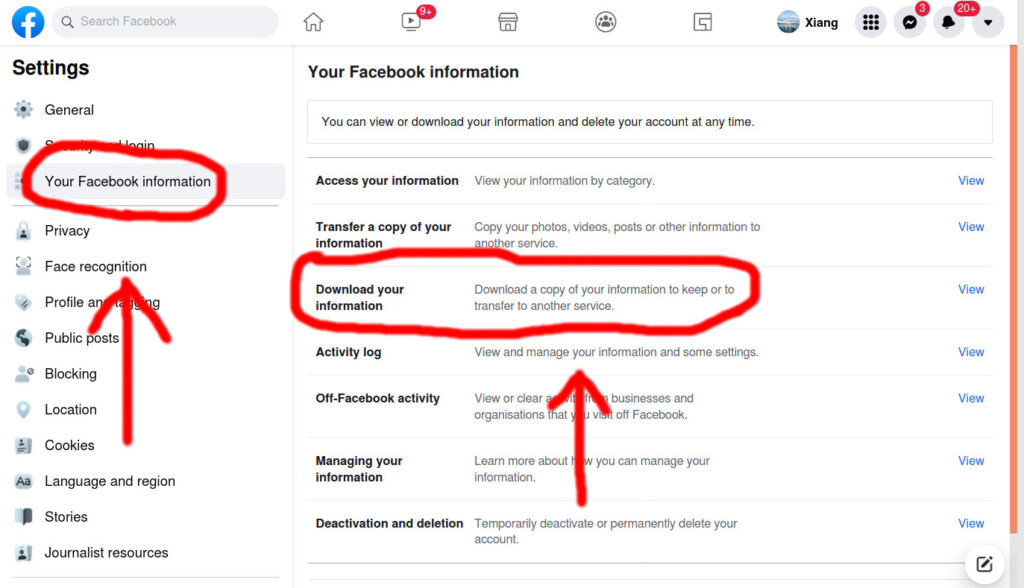
6. Select “All time” On “Data range” in the centre and check that all your activities on the right are selected.
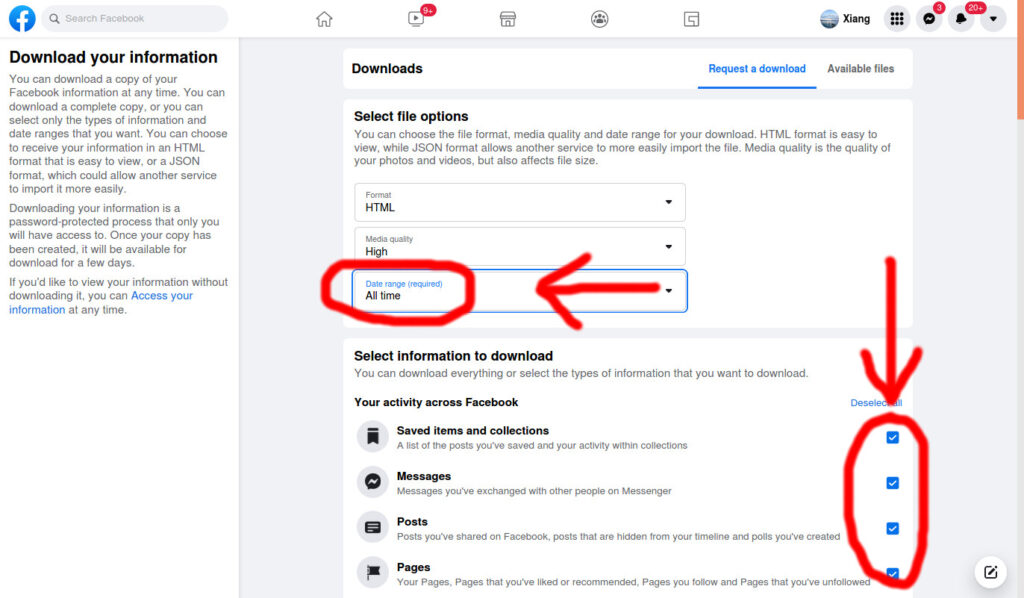
7. Scroll to the bottom of the page and click on “Request a download”
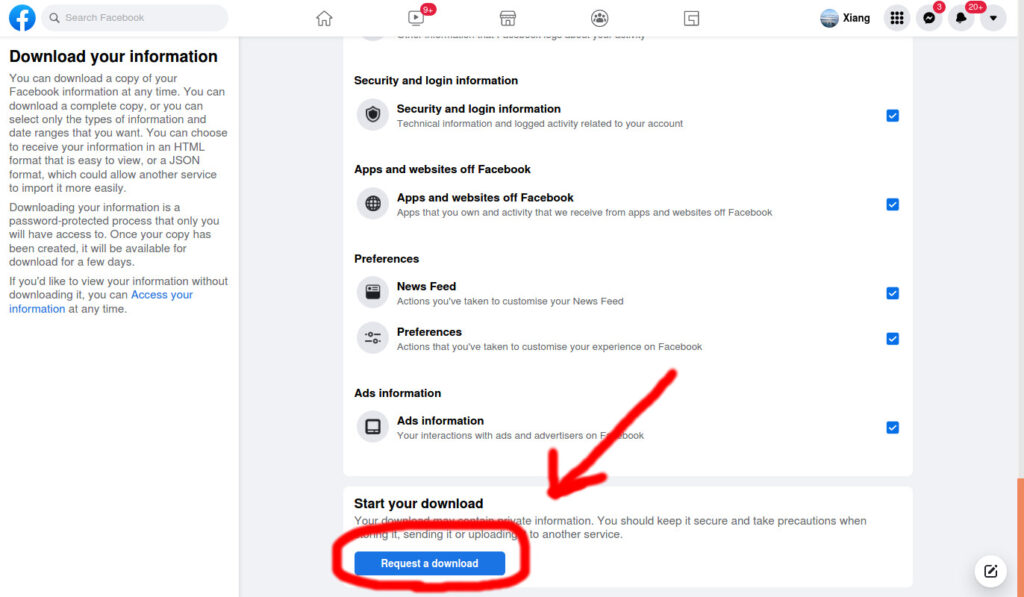
You will immediately receive an email requesting your personal data and another email when the requested data is ready to be downloaded. Depending on the volume of your data and the workload of their servers, this will take more or less time, even several hours. Be patient, it will be worth it.
Analyse your personal data
After you have received an email confirming that your personal Facebook data are ready, you can download them via a link in the same email. After you have extracted all the files, pop open a beer or a bottle of wine, order a pizza (only if you have chosen beer, as wine does not go well with pizza) and make yourself comfortable. It will take some time for you to get an idea of all the data Facebook keeps on you, but it will be worth it. The data is divided into folders (one folder for each activity) and is in HTML format. The easiest way to view it is to open the index.html file in the main folder with your browser. From there you can access all the data.
To get a good idea, I recommend that you take some time and look at everything. Below I will try to highlight the ones that seem most important to me so that you can check their scope in your specific case.
- Messages: all the messages you have exchanged with anyone on Facebook since you created your account. Message by message, word by word, comma by comma.
- Posts: all the posts you have produced, both those you are proud of and those you are now already ashamed of
- Comments and reactions: all the comments you have made to other posts and the reactions you have had, word by word, like by like
- Your search history: every single thing you have ever searched for on Facebook
- Main location and device location
- Events: all the events you have created that you have participated in or simply been invited to
- Your photos: all your photos… i.e. what used to be your photos that are now legally on Facebook
- Profile information
- History of profile updates
Discussion: What does Facebook know about you?
Some people might say: “OK, this is all the data I gave to Facebook, but what’s wrong with that?”. This data is transformed into information and processed to build user profiles that are sort of models of ourselves. I will talk in more detail about this process in the future but I have already mentioned why this is very worrying. It is also thanks to this information, or perhaps I should say because of this information, that Facebook knows you much better than you think. Better than many of your friends and boyfriends/girlfriends, and maybe, in some ways, even better than yourself.
So these are the things that Facebook knows about you:
- What is your name
- What gender are you
- When and where you were born
- Which languages you speek
- Where do you live and have you lived in the past
- Who are your relatives
- Who you have had romantic relationships with
- Who are your friends
- What schools or educational institutions you went to
- What your sexual preferences are
- What is your emotional status
- What work you do
- What is your ideology or political affiliation
- What is your religion
- What is your telephone number
- What is your personal website or blog
- What are your favourite artists and musicians
- What books are you passionate about
- What are your favourite films
- What TV programmes you like
- Your contacts in your phone
- All the messages you have exchanged with anyone
- All the posts you have written in your life
- All the comments you have made on other people’s posts in your life
- All the reactions you have had to other posts
- What topics you talk about regularly
- What websites you regularly visit
- What you look like and who you look like (can recognise your face through facial recognition)
- All the companies you have been interested in, clicked on or looked at in advertising
- All social events you have attended or simply been invited to
- Every time you have connected to its platform and from where
- When you agreed to connect with your contacts
- The main events in your life (graduation, degree, marriage, divorce, etc.)
- Every video you have watched on Facebook
- Every place you have been and when you were there
- Every photograph you have uploaded or been “tagged” with

If we multiply this information by the current number of Facebook monthly users, which according to their report of 2021 is around 2,895,000,000, and we think that 65% of these are connected daily, we can start to get an idea of the amount of data and personal information that this private company has in its hands. This amount of information is frightening, but it is only the tip of the iceberg because it represents only the personal information that its users have introduced in a more or less conscious way into the system. In addition to this, there is a huge amount of other data that is generated by users, without their knowledge, while they are surfing on the platform, namely the so-called behavioural data. But I will talk about the latter on another occasion.